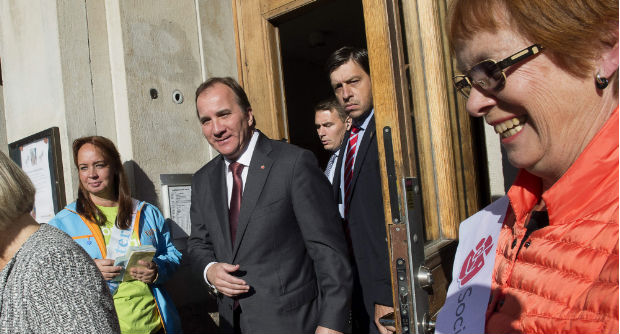Sweden shifts to left in parliamentary election

The leader of Sweden’s Social Democrats, Stefan Lofven, leaves a polling station in Stockholm during the Swedish general elections, Sunday, Sept. 14, 2014. Sweden’s parliamentary election opened Sunday with polls showing the left-leaning Social Democrats poised to return to power after eight years of center-right rule. AP
STOCKHOLM — Sweden’s Social Democrats were poised to return to power as the leaders of a left-leaning bloc that defeated the center-right government in a parliamentary election Sunday, but without an absolute majority.
With 99 percent of districts counted, the Red-Green bloc headed by the Social Democrats had 43.6 percent of the votes, while the governing coalition got 39.5 percent, official preliminary results showed.
An anti-immigration party more than doubled its support to 13 percent, leaving it with the balance of power in Parliament.
The result means an era of tax cuts and pro-market policies under Prime Minister Fredrik Reinfeldt is over in Sweden. Many Swedes worried that his tax cuts have undermined the country’s famed welfare system.
Conceding defeat, the 49-year-old conservative leader said he would step down both as prime minister and leader of the Moderate Party.
Sweden now heads into a complicated parliamentary situation.
Social Democrat leader Stefan Lofven, 57, is expected to enter into coalition talks with its main partner in the Red-Green bloc, the environmentalist Green Party, and potentially also the ex-communist Left Party.
But unless he’s able to recruit one of the center-right parties in Reinfeldt’s Alliance, he could face a situation where the anti-immigration Sweden Democrats and the Alliance jointly strike down key proposals.
“We are now Sweden’s third biggest party,” Sweden Democrats leader Jimmie Akesson told jubilant supporters. The once radical far-right party entered Parliament four years ago with 5.7 percent support.
Despite the gains, the Sweden Democrats are unlikely to attain their main goal of sharply reducing immigration because all the other parties are in favor of a liberal asylum policy.
This year, Sweden expects up to 80,000 asylum-seekers from Syria, Eritrea, Somalia, Afghanistan, Iraq and other countries — the highest number since 1992.
The rise of the Sweden Democrats has unnerved many Swedes, who regard the party as racist despite its efforts to soften its rhetoric under Akesson.
Smaller, more extreme groups are also trying to advance their positions in Sweden, including a neo-Nazi group that police said entered a handful of polling stations in Stockholm on Sunday, allegedly intimidating voters by filming them, shouting slogans and spreading confetti with political messages.
The group confirmed on its website that its activists had entered polling stations after burning ballots and an Israeli flag at a rally in downtown Stockholm.
Reinfeldt, who took office in 2006, is the longest-serving conservative prime minister in Swedish history. His center-right Alliance has cut income and corporate taxes, abolished a tax on wealth and trimmed welfare benefits. It has also eased labor laws and privatized state-owned companies, including the maker of Absolut vodka.
Meanwhile, the gap between rich and poor has grown faster in Sweden than in most developed countries, though it remains among the world’s most egalitarian, according to the Organization for Economic Cooperation and Development.
“I hope that there will be a change,” said Jonathan Andersson, a 25-year-old chef in Stockholm who blamed the government for his problems finding a “proper” job. “They changed the employment law and now I just get temporary work.”
Martin Holmen, a volunteer campaign worker for Reinfeldt’s Moderate Party, said many voters didn’t give the government enough credit for making Sweden’s economy one of the strongest in Europe.
“We have had the deepest economic crisis since the 1930s. But people in Sweden have hardly noticed it,” Holmen said. “That’s a very good grade for the Alliance.”














